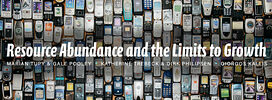Lead Essay
Marian Tupy and Gale Pooley argue that empirically speaking, resources are growing more abundant, not just as measured by inflation-adjusted price, but as measured by time prices: An hour of labor today generally buys a lot more than a comparable hour in the past. Additional human beings add to our economic capacity rather than diminishing it, because people are the solvers of economic problems.
Response Essays
Giorgos Kallis argues that we shouldn’t want economic growth to continue indefinitely. Nor will it do so. The relentless pursuit of economic growth will eventually lead to a collapse. Better, says Kallis, is to aim for prosperity without growth, which he calls “the defining challenge for twenty-first century economics.”
Katherine Trebeck and Dirk Philipsen say that the relentless pursuit of economic growth is harmful in the long term. While poverty should be alleviated, there is such thing as material sufficiency, and unfortunately, markets don’t always point at it. Often, they encourage us to substitute harmful products for beneficial natural goods. Developed economies should reposition themselves to provide economic stability, human dignity, environmental protection, and healthy communities.
The Conversation
Coming Up
Conversation through the end of the month.

